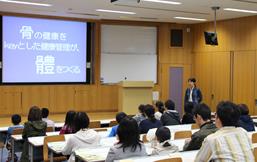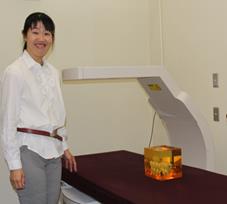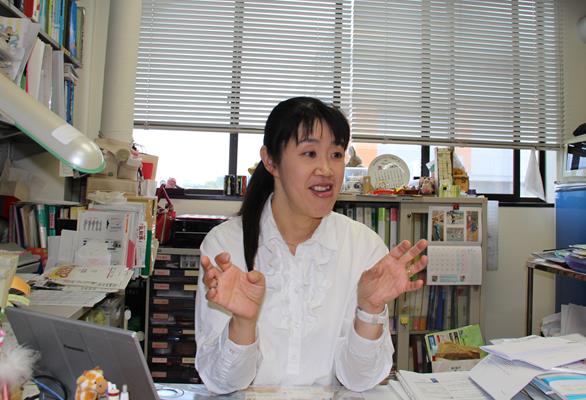TSUKUBA FUTURE
#043 Sports is More Than Just Practice—It's a Story of the Nutrients and Bones which Support an Athlete
Associate Professor OMI Naomi, Faculty of Health and Sport Sciences

Athletes get through tough practices with hard work and tenacity. But is that enough for an athlete to achieve outstanding results? An athlete can only build strong muscles and continue with quality training as long as he or she properly eats and rests. That is, diet is the most basic and important factor for an athlete. Prof. Omi is providing support to build bones and bodies from the standpoint of nutrition and dietary practices.
It has long been a matter of common sense that calcium is needed for strong bones. It has also been known that other nutrients and exercise play a major role in bone health. The health condition of the entire body is reflected in the bones, even though their metabolism is slow compared to the body's other tissues. Therefore, it is possible to gain a rough understanding of a person's state of nutrition and lifestyle habits based on bone density and other bone data, and this can contribute to health management and building the bodies of athletes.
What sort of diet is the best for making bones strong? That was the starting point for Prof. Omi's research. Just as she happened to be studying the relationship of nutrition and exercise for strengthening bone, a need arose in the sporting world to provide diet management support for athletes. At present, she is working to provide information to coaches and nutritionists involved in athletics so that support can be provided to a larger number of athletes.
In their daily practice, athletes consume more than twice the energy of an ordinary person. However, there is a limit on the amount of food that can be taken into the stomach at one time, and it is not possible to simply double meal size. The key point is to increase the number of meals, while ensuring that each individual meal is also moderately balanced. Different sports have different ideal body types, and adjustments must be made so that the body's condition peaks in the appropriate season. If the training is continued without a break, there is a risk of bone deterioration and disorders due to loss of hormone balance, psychological stress and similar factors. Diet is the basic approach for dealing with these issues. Specialized knowledge of nutrition, foods and food preparation is essential for maintaining and strengthening the bodies of athletes.

Lecture for parents and children at the "Kid's University" during the University of Tsukuba Science and Technology Week
To provide dietary guidance, the first step is to evaluate the person's previous dietary situation. In particular, junior and university athletes do not prepare their own food, and they have varying levels of knowledge relating to nutrition. Even writing down the details of what they eat can be a chore. Together with graduate students in her laboratory, Prof. Omi has developed an evaluation system in which subjects' dietary tendencies are divided into a number of categories, and the category is determined based on a simple questionnaire. This makes it possible to provide individual suggestions regarding dietary practices which are nutritionally beneficial and improve sports motivation, even if the ingested amounts of each nutrient are not measured in detail.

Experimental measurement system for bone density
In her youth, Prof. Omi was devoted to basketball, and an experience of suffering from anemia led her to become a nutritionist. Even though she ate adequate, balanced meals, she developed anemia due to the inability of her blood constituents to increase enough to keep up with the rapid growth of her body. She chose nutritional science because she wanted to gain a practical understanding of such mechanisms. Within nutritional science, research on bones covers a variety of fields, from athlete diet support and sports drink development, to elucidation of the mechanisms of age-related conditions such as osteoporosis and arteriosclerosis, and analysis of the effects of training carried out by astronauts while in the zero gravity conditions of space. This is a very deep domain in which these diverse fields are interrelated.
Prof. Omi is working to improve a school cafeteria by, for example, routinely disseminating basic food information to students through classes, providing nutritional support via techniques such as body composition measurement, and publishing a newsletter. For many students, a school cafeteria are the cornerstone of their nutritional intake. From menus and price setting, to areas such as innovations in space design and holding events?operation of a school cafeteria program is a venue for dietary education, and can be the subject of large-scale, interdisciplinary research projects. There are some issues to be dealt with in the area of facilities, but Prof. Omi would like to realize a cafeteria that can also be used as an instructional tool.

Describing her dream of creating the ideal school cafeteria
There is no food that will ensure a person is healthy provided they eat it. The body is a very complicated mechanism, and absorption and excretion of nutrients is finely controlled by detecting the moment-to-moment state of the body. If a person maintains awareness of bone health in daily life, the end result will be continued health of the entire body. On the other hand, it is not good to worry too much about diet. Even athletes want to eat sweets sometimes. It's depressing to worry about calories so much that you have to strip off the batter coating before eating fried foods. The important thing is to achieve a balance over a period of a day or a week. Even if a person has no special knowledge, making an effort simply to eat meals comprised of a staple food, main dish and side dish, will ensure that nutrients are taken in with a certain degree of balance. Prof. Omi's motto is that enjoying eating is the most important thing. She would like to broaden the habit of thinking about diet, in whatever ways she can, beyond athletes to the public at large.
Article by Science Communicator at the Office of Public Relations


